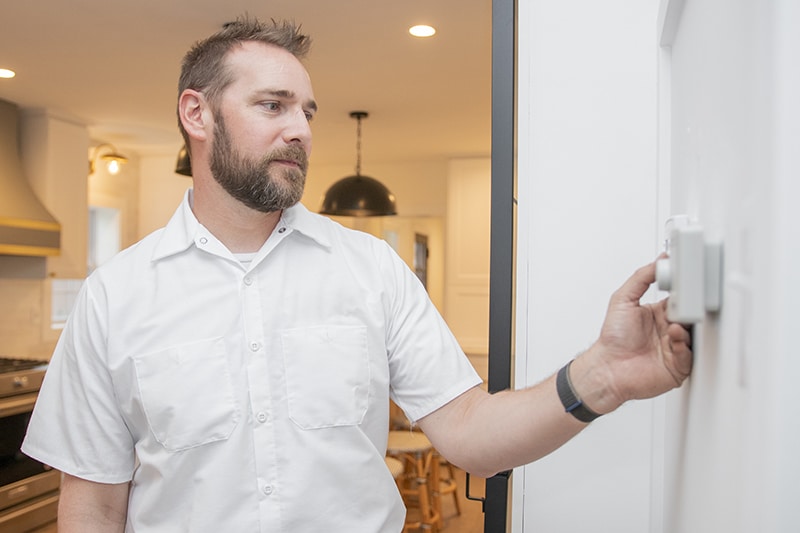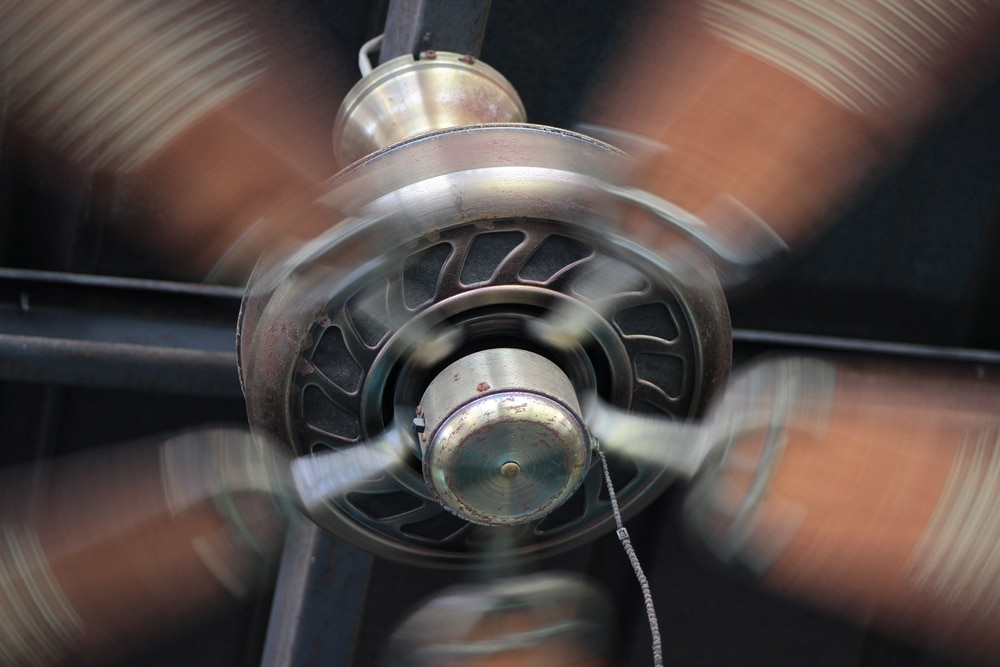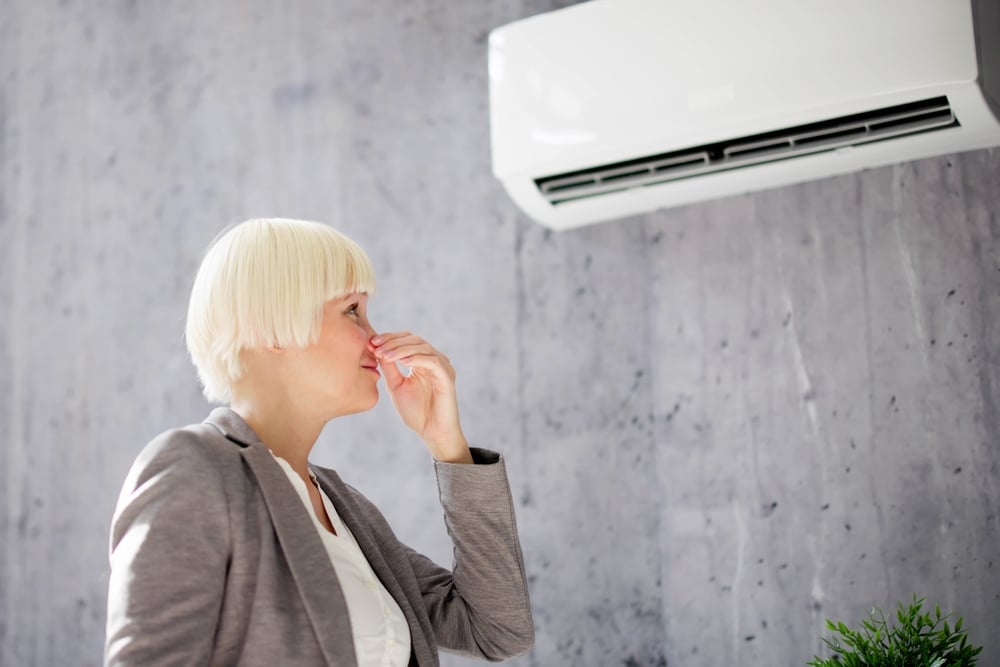Getting the best performance out of your air conditioner is essential. Not only does it improve your home’s energy efficiency and lower your bills, but it also extends the life of your air conditioner. You can make a difference in your AC system’s performance by carefully using your air conditioner and properly maintaining it.
Table of Contents
- Understanding Your AC System
- Average AC Lifespan & How to Extend It
- Importance of AC Size on System Efficiency
- Air Conditioner Maintenance and Upkeep
- Efficient Usage and Troubleshooting
- Identifying and Mitigating Common AC Problems
- Enjoy Your Home with an Efficient AC for Years to Come
- Frequently Asked Questions About AC Performance
Understanding Your AC System
The modern air conditioner is a complex system that absorbs heat from the air inside your home and then sends the cooled air back through the air ducts to make your home as comfortable as possible. As technology has advanced, these units now have multiple settings and modes to help you maximize comfort while minimizing energy use. Understanding how these modes work is a critical factor in maximizing efficiency. These modes include:
- Cool mode: This mode typically has a snowflake as its symbol. The default cooling mode signals the AC unit to turn on the compressor and send cold air through your home.
- Fan mode: Air conditioners have fans that circulate air. You can have the fan on with the cooling mode set or keep it on at all times to circulate the air and keep it fresher. This setting typically looks like a fan or windmill.
- Dry mode: If you live in a humid area, you can use this setting to dehumidify the air when the AC runs. If you have a split AC system, you can even turn on dry mode in certain home areas. This setting may look like a water droplet.
- Heat mode: Some units have a reverse setting that releases cooled air to the outdoors and sends hot air into your home. You can use this during the colder seasons, but you may find using your furnace is more cost-effective. This mode is symbolized by a sun.
In addition, some high efficiency air conditioning systems will have additional eco-friendly modes. Make sure you get to know the settings on these energy efficient ACs if you have one.

Electricity Consumption and Your Unit
Air conditioning units rely on electric power to do their job. The various modes all require electricity to run. You can set your system to make the most out of your electricity consumption.
For example, many homeowners want to circulate the air in the home by leaving the fan running at all times. While this can circulate air well, it raises energy bills. If you want to save energy costs, run the fan only when the AC is also running.
Some air conditioners have smart technology that adjusts settings based on whether you are home or in an individual room. This can help you manage your electricity usage and avoid over-cooling the home when you’re not in it.
Average AC Lifespan & How to Extend It
The U.S. Department of Energy estimates the average lifespan of an air conditioner to be around 15 years. Good maintenance can extend this to 20 years or more, though as these systems age, they tend to lose efficiency.[1]
Extending Your Air Conditioner’s Lifespan
To extend your air conditioner’s lifespan, treat it with care. Annual maintenance and cleanliness are both vital. In addition, make sure you have a system properly sized for your home to avoid system overload. By doing these three things, you can maximize your air conditioner’s lifespan.
Importance of AC Size on System Efficiency
As you’re considering ways to maximize efficiency, consider the size of your AC unit. If the unit is too large for the home, it will use too much energy to do the job. If it’s too small, it will work overtime to cool the home, which hurts efficiency and lifespan. Selecting a proper-sized AC unit for your home is a crucial first step.
Air Conditioner Maintenance and Upkeep
Another key to extending the life of your AC and maximizing its efficiency is regular air conditioner maintenance.[2] We recommend a professional maintenance check at least once a year, and we also recommend upkeep you can do on your own, such as keeping shrubs and dirt away from the outdoor unit and regularly changing the air filter.
Importance of Regular AC Maintenance
Your air conditioner has many moving parts. Over time, those parts can become dirty or worn out. Regular AC maintenance cleans and checks the system to ensure it’s working at optimal performance levels.
What to Expect from Air Conditioner Tune-Ups
When receiving an AC tune-up, here are some of the things you can expect:
- Thorough cleaning of the unit, including indoor and outdoor unit
- Testing the effectiveness of the system
- Adding coolant, if needed
- Tightening electrical connections and other bolts and wires
- Suggesting potential repairs
- Checking and calibrating the thermostat
- Replacing or cleaning the air filter
- Inspecting the blower, motor, and condenser
- Lubricating moving parts
At this appointment, your technician can help you choose the right filter for your system, ensure the system maintains good airflow with properly cleaned components, and provide a list of suggested repairs you might want to plan for in the coming months.
Efficient Usage and Troubleshooting
In addition to maintenance, you can make the most out of your AC with efficient use. Consider these energy efficient AC tips:
Efficient AC Usage
Use your air conditioner efficiently by changing your settings so it isn’t running as much when sleeping or away from home. When choosing a temperature, consider the 20-degree rule. This rule states you should never set the thermostat more than 20 degrees cooler than the outdoor air. Thus, on a 100-degree day, set the temperature at 80 degrees or higher. Remember, you’ll save about 5% on your cooling costs for every degree you raise the temperature.[3]
It’s easy to forget to change your thermostat settings. Consider investing in a smart thermostat you can control remotely.
Efficient Household Appliance Usage
Another way to avoid over-inflated cooling costs is with efficient use of your appliances. Try not to run heat-generating appliances, like the oven, on extremely hot days. Try to use the microwave, make cold meals like salads, or use just the stovetop. If you need these appliances in warmer months, try to use them during the cooler part of the day.

Strategies for Temperature Control
Here are some additional strategies for controlling the temperature of your home to maximize your AC efficiency:
- Utilize window coverings: Window coverings keep the cooled air where it belongs – inside your home.
- Sun-blocking: Use furniture or even outdoor plants to keep the sun off of your windows during the hottest part of the day.
- Natural ventilation: During the cooler part of the day, open some windows to let cool, fresh air in.
- Ceiling fans: With a ceiling fan, you can keep the thermostat setting a few degrees warmer without changing your comfort level.
Identifying and Mitigating Common AC Problems
No matter how careful you are with your air conditioner, it may have problems from time to time. Here are some common issues and some solutions to consider as you work on having energy efficient air conditioning.
Signs of an Inefficient AC System
Inefficiency can come from many causes. It can be a system breakdown, low refrigerant levels, poorly installed ducts, air duct leaks, and much more. Here are some signs that your system is running inefficiently:
- Hot spots in your house or uneven cooling
- Extremely high energy bills
- Clogged air filters
- Dirty AC coils
- Fluctuations in temperature throughout the day
- Inability to keep up with outdoor air
If you notice these issues, you will want to contact an HVAC professional to pinpoint the cause.
Dealing with Dryness in Winter
Air conditioners tend to dehumidify the air, but in winter, you may find that the air becomes too dry. One way to ensure your home has the proper moisture level is to pair an air conditioner with a humidifier and dehumidifier. This way, you can control humidity levels while also controlling the temperature.
Loud AC Systems
Another problem that can come up with air conditioners is noise. Your system should make a little noise but typically nothing more than a dull hum. Loud noises usually indicate a problem. Some common reasons for this include:
- Air duct issues
- Broken condenser fans
- Dirty air filters
- Low refrigerant issues
- Loose parts rattling around in the system
Each problem must be addressed independently, and some, like low refrigerant or air duct issues, require professional service.

Other Common AC Issues Impacting Efficiency
Some additional issues that are common with air conditioners include:
- Refrigerant leaks: Without refrigerant, the system can’t do its job. Leaks need to be repaired, and the refrigerant recharged for the system to work.
- Bad smells: Bad smells can come from mold and mildew somewhere in the system.
- Frozen evaporator coil: If your outdoor unit builds up with ice, it’s either a lack of airflow or low refrigerant levels.
- Running constantly: Many issues can cause this, including filter problems, improper sizing, and a breakdown between the thermostat and the AC.
- Short cycling: This is another common problem that has multiple potential causes to consider. A clogged air filter or electrical issues can all be reasons for this.
Enjoy Your Home with an Efficient AC for Years to Come
A hot home is hard to enjoy. Keeping your air conditioner efficient is a key to enjoying your home and keeping it cool. If you need professional help maintaining your air conditioning system, contact an experienced HVAC company to get started.
FAQs
The typical lifespan of an air conditioner is around 15 years. Though this lifespan can be extended or cut short depending on the care and maintenance the unit receives.
Running your AC all day could lead to higher energy bills and a shortened lifespan. Consider turning it off or increasing the temperature while at work or asleep.
Yes, when an air filter is dirty, the unit can’t circulate air like it should, which hurts performance. A dirty filter can also strain your system, causing damage to other components within the unit.
If you can be comfortable without the AC, it’s more efficient to turn your system off at night. Increasing the temperature is another way to achieve greater efficiency without turning the unit off completely.
Routine maintenance, optimizing settings with a smart thermostat, and using heat-reducing strategies around your home will all improve the efficiency of your air conditioner. It is best to contact a professional to help determine the best methods for your home.
The 20-degree rule says to keep the AC no more than 20 degrees cooler than the outside air for optimal efficiency. So, if it is 90 degrees outside, the system should be set to 70 degrees or higher.



